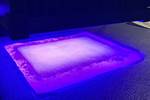Toray obtains ABS type approval for in-situ VARTM ship repairs
American Bureau of Shipping (ABS) certifies use of jointly developed CFRP repair technique on FPSO and FSO industrial systems, addressing traditional steel restoration challenges.
Toray Industries Inc. (Tokyo, Japan), announces that it has became the first in the world to obtain type approval from the American Bureau of Shipping
(ABS, Houston, Texas, U.S.) for its vacuum-assisted resin transfer molding (VARTM) process for in-situ ship repairs. This process entails Toray applying carbon fiber-reinforced plastic (CFRP) material to corroded areas often found on metal floating production, storage and offloading (FPSO) and floating storage and offloading (FSO) systems.
ABS is a leading classification society accounting for around half of FPSO
and FSO certifications. This approval enables VARTM to be applied to these certified vessels, reducing the time needed for engineering reviews and
verification for ship repairs.
FPSO and FSO maintenance is typically performed offshore and uses steel materials. However, welding — or hot work — halts oil and gas production. In 2020, Toray and shipbuilding company Modec Inc. (Tokyo) jointly developed a VARTM repair process for these applications (read “Modec, Toray … repair solution using CFRP patches”). It entails applying Toray’s Torayca carbon fiber woven fabric — offering high strength and elasticity — to the surfaces of existing steel structures. Then, the fabric is covered with a film, vacuum sealed and injected with epoxy resin that is cured, bonding the CFRP to the structure.
An advantage to this in-situ VARTM process is the ease in transporting the materials and equipment required to specific locations. It can also be used to perform repairs faster and with fewer people compared to steel-based techniques. Moreover, since the procedure does not involve hot work,
it minimizes the impact on oil and gas production.
Toray says it will continue to work on its in-situ VARTM process for a range of industrial applications while developing repair and reinforcement technologies for FPSOs and FSOs to promptly address market needs.
Related Content
-
Infinite Composites: Type V tanks for space, hydrogen, automotive and more
After a decade of proving its linerless, weight-saving composite tanks with NASA and more than 30 aerospace companies, this CryoSphere pioneer is scaling for growth in commercial space and sustainable transportation on Earth.
-
Cryo-compressed hydrogen, the best solution for storage and refueling stations?
Cryomotive’s CRYOGAS solution claims the highest storage density, lowest refueling cost and widest operating range without H2 losses while using one-fifth the carbon fiber required in compressed gas tanks.
-
The potential for thermoplastic composite nacelles
Collins Aerospace draws on global team, decades of experience to demonstrate large, curved AFP and welded structures for the next generation of aircraft.

















